Have you ever experienced a situation where you wanted to buy a product from a store, but the salesperson tried to persuade you to buy a more expensive or upgraded version of it? Or maybe they offered you some additional products that you didn’t really need or want?
That is called upselling, a sales technique that aims to increase the revenue and profit of the seller by making the customer spend more than they intended.
But what if the seller resorts to dishonest measures to meet their sales goals, at your expense?
This is a hot topic of discussion in Indonesia at the moment, with plenty of people online sharing their experiences with sneaky upselling tactics.
TikTok user @.syanaka kick-started the conversation with her video about being deceived into paying more at local donut chain JCo. Twitter account @txtdarionlshop, which aggregates viral posts about the retail industry, reposted her story, which went hugely viral over the weekend.
In short, @.syanaka intended to buy just a dozen donuts, for which the cashier charged her IDR124K (US$8.33), which the Tiktokker thought was more expensive than usual. The staff then offered her a slice of red velvet cake, ostensibly as a “bonus” freebie with her purchase.
She checked the purchase receipt after she had left the store. It was only then that she realized that the staff had tricked her into buying a donuts+cake package.
“Upselling without the consumer’s consent is considered a scam,” user @Carlos_Imanuel wrote in the replies.
In other replies to the tweet, which has been viewed more than 16 million times in two days, netizens called out the shady practice and shared their own anecdotes about being upselling victims.
A common thread in their stories is that sellers are often not entirely transparent about whether or not the extras or substitutions that they’re offering to consumers come with added costs.
“At KFC, I didn’t understand how a meal could cost IDR100K (US$6.72). It turned out that they made me buy a music CD. At Pizza Hut they added on extra cheese even when I never asked for it. At Starbucks, beware ice cream, caramel add-ons. At A&W they give you extra Oreos with your waffles,” user @selli_rosalina shared about her experiences.
Also Read
Upselling is a sneaky and sometimes shady way to make you fork out more cash than you planned. Whether it’s a slice of cake, a music CD, or extra cheese, these sellers are not always upfront about the hidden costs of their “bonuses” or “upgrades”. Don’t fall for their tricks and always check your receipts before you leave the store.
And sellers should know by now about the immense power of viral stories and the vindictiveness of Indonesians scorned. Upselling can be beneficial to both parties if it’s done with respect and transparency, but it can also backfire and ruin a business’s reputation if the intention is to scam customers in the first place.




